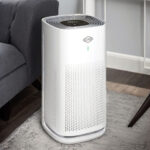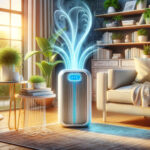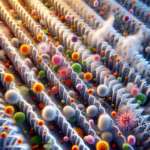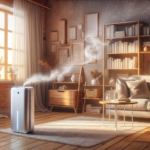HEPA filters and True HEPA filters are both commonly used in air purification systems to remove airborne particles and improve indoor air quality. While they share similarities in terms of their purpose and function, there are several key differences between the two. Understanding these differences can help you make an informed decision when choosing the right filter for your specific needs.
Key Takeaways
- HEPA filters have a minimum efficiency of 99.97% in capturing particles as small as 0.3 microns, while True HEPA filters have a minimum efficiency of 99.97% in capturing particles as small as 0.1 microns.
- True HEPA filters are tested and certified to meet strict standards set by the United States Department of Energy (DOE), while HEPA filters may not undergo the same level of testing and certification.
- True HEPA filters are made with a more advanced construction that includes a dense fiber layer, which allows them to capture smaller particles more effectively.
- HEPA filters typically have a longer lifespan compared to True HEPA filters, as they can last up to 12 months before needing to be replaced, while True HEPA filters usually need to be replaced every 6 to 8 months.
- True HEPA filters are generally more expensive than HEPA filters, but they provide superior filtration performance and are recommended for individuals with allergies or respiratory conditions.
What is a HEPA Filter?
Definition of HEPA Filter
A HEPA filter, which stands for High Efficiency Particulate Air filter, is a type of air filter that is designed to capture and remove small particles from the air. HEPA filters are highly efficient and can remove up to 99.97% of particles that are as small as 0.3 microns in size. These filters are commonly used in air purifiers, vacuum cleaners, and HVAC systems to improve indoor air quality.
- HEPA filters are made up of a dense mat of randomly arranged fibers.
- The fibers are typically made of fiberglass and are pleated to increase the surface area for particle capture.
- As air passes through the filter, the particles are trapped in the fibers, allowing only clean air to pass through.
- HEPA filters are particularly effective at capturing allergens such as pollen, pet dander, and dust mites.
- They can also capture fine particles like smoke, bacteria, and viruses.
Tip: Regularly replacing the HEPA filter is important to maintain its effectiveness in removing particles from the air.
How HEPA Filters Work
HEPA filters work by using a dense mat of fibers to trap particles as air passes through. These filters are designed to capture particles as small as 0.3 microns in size, including dust, pollen, pet dander, and mold spores. The fibers in a HEPA filter create a maze-like structure that forces air to change direction multiple times, increasing the chances of particles getting trapped. The high efficiency of HEPA filters makes them ideal for removing allergens and pollutants from the air.
- HEPA filters use a dense mat of fibers to trap particles
- Can capture particles as small as 0.3 microns
- Effective in removing allergens and pollutants from the air
- Ideal for individuals with allergies or respiratory conditions
Tip: Regularly replacing HEPA filters is essential to maintain their effectiveness in capturing particles.
What is a True HEPA Filter?
Definition of True HEPA Filter
A True HEPA filter is a type of high-efficiency particulate air (HEPA) filter that meets the strict standards set by the United States Department of Energy. It is designed to capture particles as small as 0.3 microns with an efficiency of 99.97%. The True HEPA filter is made up of densely packed fibers that create a maze-like structure, allowing it to trap even the tiniest particles. Unlike regular HEPA filters, True HEPA filters are tested and certified to ensure their performance and effectiveness.
- True HEPA filters are highly efficient in removing allergens, dust, pollen, pet dander, and other airborne particles.
- They are particularly beneficial for individuals with allergies, asthma, or respiratory conditions.
- True HEPA filters can help improve indoor air quality by reducing the presence of pollutants and irritants.
- It is recommended to replace True HEPA filters regularly to maintain their efficiency and effectiveness.
Tip: When purchasing a True HEPA filter, look for the certification label to ensure its authenticity and performance.
Advantages of True HEPA Filters
True HEPA filters offer several advantages over regular HEPA filters:
- Higher Filtration Efficiency: True HEPA filters have a higher efficiency in capturing particles as small as 0.3 microns, ensuring cleaner air.
- Improved Air Quality: With their superior filtration capabilities, True HEPA filters can effectively remove allergens, dust, pollen, pet dander, and other airborne pollutants, improving indoor air quality.
- Reduced Allergy Symptoms: By removing allergens from the air, True HEPA filters can help reduce allergy symptoms such as sneezing, coughing, and itchy eyes.
- Better Protection: True HEPA filters provide better protection against harmful particles, including bacteria, viruses, and mold spores, making them ideal for individuals with respiratory conditions or weakened immune systems.
- Longer Lifespan: True HEPA filters typically have a longer lifespan compared to regular HEPA filters, reducing the frequency of filter replacements.
- Peace of Mind: Knowing that you have a True HEPA filter in your air purifier gives you peace of mind, knowing that you are breathing cleaner and healthier air.
Key Differences Between HEPA and True HEPA Filters
Filter Efficiency
Filter efficiency is a crucial factor to consider when choosing between a HEPA filter and a True HEPA filter. Filter efficiency refers to the ability of a filter to capture and retain particles of different sizes. HEPA filters are designed to remove 99.97% of particles that are 0.3 microns or larger in size. On the other hand, True HEPA filters are even more efficient, with a minimum efficiency of 99.97% for particles as small as 0.1 microns. This means that True HEPA filters can effectively capture smaller particles, including allergens, dust mites, pet dander, and even some viruses.
- HEPA filters: 99.97% efficiency for particles 0.3 microns or larger
- True HEPA filters: 99.97% efficiency for particles 0.1 microns or larger
When it comes to filter efficiency, True HEPA filters provide superior performance and are recommended for those with allergies, asthma, or other respiratory conditions. Their ability to capture smaller particles ensures cleaner and healthier air in your home or office.
Filter Certification
Filter certification is an important aspect to consider when comparing HEPA and True HEPA filters. Certification ensures that the filter meets specific standards and is capable of effectively removing particles from the air. HEPA filters are certified to meet the standards set by the United States Department of Energy (DOE) and are required to remove at least 99.97% of particles that are 0.3 microns in size. True HEPA filters, on the other hand, are certified to meet even higher standards, removing 99.97% of particles that are as small as 0.1 microns in size.
When choosing between HEPA and True HEPA filters, it is important to consider the level of filtration required for your specific needs. If you have severe allergies or asthma, a True HEPA filter may provide better air purification due to its higher certification standards. However, for general air purification needs, a HEPA filter may be sufficient.
Here is a comparison table highlighting the certification standards for HEPA and True HEPA filters:
| Filter Type | Particle Size | Certification Standard |
|---|---|---|
| HEPA | 0.3 microns | 99.97% |
| True HEPA | 0.1 microns | 99.97% |
Filter Construction
The construction of a HEPA filter and a True HEPA filter is very similar. Both filters are made up of multiple layers of fine fibers, usually made of fiberglass or synthetic materials, that are tightly woven together. These layers are then pleated to increase the surface area of the filter, allowing for more efficient filtration.
One key difference in filter construction is the thickness of the filter media. True HEPA filters are typically thicker than standard HEPA filters, which allows them to capture smaller particles. The increased thickness also means that True HEPA filters generally have a higher airflow resistance, requiring more powerful fans or motors to push air through the filter.
Another difference is the presence of an additional layer in True HEPA filters. This layer, known as an activated carbon layer, helps to remove odors and volatile organic compounds (VOCs) from the air. Standard HEPA filters do not have this additional layer.
In summary, while the construction of HEPA filters and True HEPA filters is similar, True HEPA filters are typically thicker and include an activated carbon layer for odor and VOC removal.
Filter Lifespan
The filter lifespan is an important factor to consider when choosing between a HEPA filter and a True HEPA filter.
- HEPA filters typically have a longer lifespan compared to True HEPA filters. This is because HEPA filters are designed to capture larger particles, which means they can last longer before needing to be replaced.
- True HEPA filters, on the other hand, have a shorter lifespan because they are designed to capture smaller particles, including ultrafine particles as small as 0.3 microns. The smaller particles can clog the filter more quickly, reducing its lifespan.
- It is recommended to check the manufacturer’s guidelines for the specific filter lifespan and replacement frequency.
- Regular maintenance, such as vacuuming or washing the filter, can help extend its lifespan and maintain its effectiveness.
- In some cases, filters may have an indicator that shows when it needs to be replaced, making it easier to determine the lifespan.
- It is important to replace the filter within the recommended timeframe to ensure optimal filtration efficiency.
Conclusion
In conclusion, both HEPA and True HEPA filters are effective in removing airborne particles and improving indoor air quality. However, there are several key differences between the two. True HEPA filters have a higher filter efficiency and are certified to meet strict standards, making them more reliable in capturing smaller particles. Additionally, True HEPA filters are constructed with finer materials and have a longer lifespan compared to regular HEPA filters. When choosing a filter, it is important to consider your specific needs and the level of filtration required. Overall, both types of filters are beneficial for maintaining a clean and healthy environment.
Frequently Asked Questions
1. What is the main difference between HEPA and True HEPA filters?
The main difference between HEPA and True HEPA filters is the level of filtration efficiency. True HEPA filters are able to capture a higher percentage of particles compared to regular HEPA filters.
2. Are True HEPA filters more expensive than HEPA filters?
Yes, True HEPA filters are generally more expensive than regular HEPA filters due to their higher filtration efficiency.
3. Can HEPA filters remove odors and gases?
HEPA filters are primarily designed to capture solid particles such as dust, pollen, and pet dander. They are not specifically designed to remove odors and gases.
4. How often should HEPA filters be replaced?
The frequency of HEPA filter replacement depends on various factors such as usage, air quality, and manufacturer’s recommendations. It is generally recommended to replace HEPA filters every 6 to 12 months.
5. Are HEPA filters effective against viruses and bacteria?
HEPA filters can capture some viruses and bacteria, but their effectiveness may vary depending on the size of the particles and the specific filter design. It is recommended to use filters specifically designed for virus and bacteria removal in healthcare settings.
6. Can True HEPA filters help with allergies?
Yes, True HEPA filters can help reduce allergens in the air such as pollen, dust mites, and pet dander, which can alleviate allergy symptoms for some individuals.







